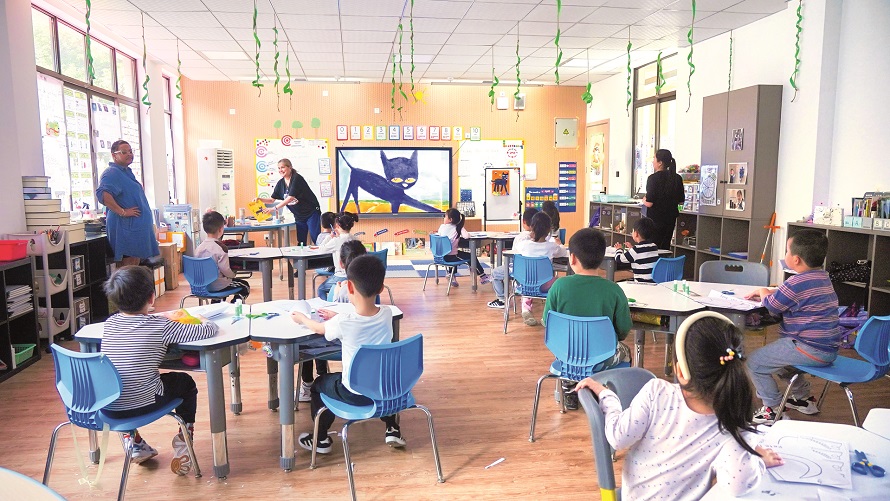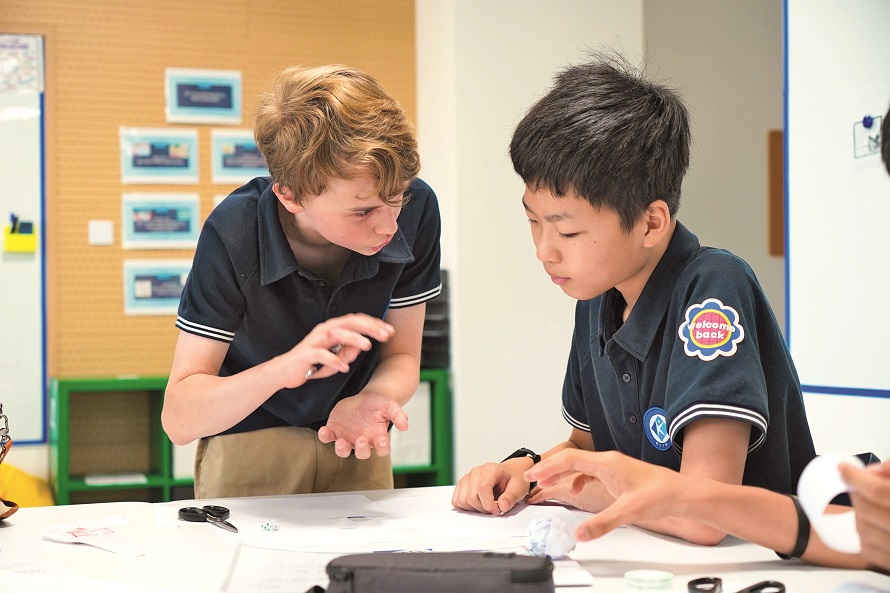
Amid the tug-of-war between “burden reduction” and “involution,” “happy education” has become a widely discussed topic in the education sector. What is the essence of “happy education,” and how can it be implemented? According to Mr. Zhou Xiangke, Board Member of the KL International School of Chongqing Bashu (KLIS), “happy education” is not simply about easing academic burdens or placing students in low-challenge environments. Instead, it involves thoughtful design that enables students to gain lasting fulfillment through challenges.
As the only international school in Chongqing that integrates a full American-style K-12 curriculum, KLIS adheres to the K-12 education philosophy. Through innovative teaching models such as project-based learning, problem-solving approaches, and phenomenon-based learning, KLIS has built an educational ecosystem that integrates interest, a sense of purpose, and student autonomy, continuously enriching students’ learning experience.
Interest-Oriented: Breakthroughs Fostering a Sense of Academic Accomplishment
“True happiness comes from the sense of achievement after overcoming challenges rather than avoiding difficulties,” says Zhou Xiangke. Dodging difficulties might bring temporary ease, but it takes away opportunities to develop critical thinking and achieve breakthroughs, ultimately eroding one’s courage and confidence to take on challenges. In the long run, this cannot bring genuine happiness.

Zhou shares the example of K, a Japanese student who, upon arriving at KLIS, was faced with an unfamiliar language and culture. With no prior English knowledge, she was initially reluctant to speak. The teachers, rather than rushing to deliver knowledge, began with her favorite picture books and cartoons to guide her toward self-expression while providing affirmation and encouragement. Through every small step, K gradually built her confidence. She began participating in group activities and gave small presentations in English about Japanese culture during project-based learning sessions. While improving her language skills, she slowly integrated into the new environment. In just one month, she blossomed into a “Star Student,” gaining the joy of overcoming language barriers.
K’s transformation vividly illustrates KLIS’s happy education approach. Zhou explains that true happy education is student-centered, igniting intrinsic motivation and guiding students to discover the joy of learning through active exploration and deep thinking. This leads to continuous personal breakthroughs and a virtuous cycle of achievement and motivation—a core educational philosophy consistently practiced at KLIS.
“The essence of happy education also lies in goal-oriented self-motivation,” says Zhou. Learning is a self-driven journey—only with direction can it provide students with momentum, and only with passion can exploration reach in-depth level.
In this era of rapid innovation and transformation, KLIS is committed to cultivating future talent with independent learning abilities and global visions. Through inquiry-based curricula such as project-based learning and STEAM education, students are encouraged to explore real-world issues and phenomena, developing independent thinking and creativity. Moreover, artistic expression, stage performances, and music composition activities add warmth and inspiration to the learning process.
One transfer student who joined KLIS from a private school shifted from “passive compliance” to “active planning.” Previously addicted to short videos, now manages her reading and study time by herself. Zhou explains this change stems from a redefined educational philosophy—when students understand “why they learn” and “what learning enables them to do”, education transforms from a task into a journey of exploring the world and understanding oneself.
This example, Zhou notes, shows that true learning motivation does not come from external pressure but from internal drive. Once students grasp the meaning of learning, their choices become self-directed. At KLIS, this internal drive is awakened through goal-setting, turning each student into an “explorer” of their own learning path, rather than a passive “follower.”
Autonomy-Oriented: Autonomy in Learning Igniting Infinite Possibilities
“Empowering students with autonomy is the key to activating intrinsic motivation for learning,” Zhou states. When students can control the pace of their learning, education shifts from a passive duty to active discovery—often unleashing unprecedented creativity.
Take L and E, a pair of Chinese-German siblings. Before coming to KLIS, they had lost interest in learning due to rigid and standardized teaching at their previous school. At KLIS, however, they rekindled their enthusiasm through personalized education. The advisors at KLIS tailored personalized class schedules for students based on their interests and learning pace, striking a balance between academic rigor and individual strengths. This allows students to discover a learning path that truly belongs to them—one driven by “I want to learn” and “I choose to learn.”
Zhou points out that children are not incapable of learning—they simply need the freedom to learn in their own ways. When students are given the right to choose and speak up, learning becomes something they look forward to and are willing to immense themselves in. L and E’s transformation is a fine example of this.
With unlimited course options, diverse teaching methods, and flexible learning rhythms, KLIS opens the door to self-driven growth for every student. Its educational model proves that happy education does not mean lowering standards—it means awakening intrinsic motivation through trust and empowerment. When students take charge of their learning, education shifts fundamentally from the “transmission of knowledge” to “the cultivation of skills,” laying a solid foundation for them to become adaptable global citizens.
(All Student Names are Pseudonyms)
By He Yu/The World and Chongqing

重庆与世界杂志社 Copyright 2000-2023 Cqworld.cn All Rights Reserved. 渝ICP备:05006161/渝公网安备50010302504769号
国内发行:重庆市报刊发行局\杂志社自发 | 国外发行:中国国际图书贸易总公司
地址:重庆市渝中区学田湾正街1号广场大厦11F,举报电话:023-68898926,违法和不良信息举报中心热线:12377

微信公众号